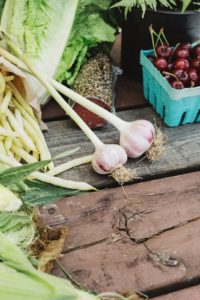We constantly hear the buzz-word “non-GMO” as it pertains to healthy eating and overall nutrition, but what exactly does non-GMO mean?
Non-GMO refers to non-genetically modified organisms, meaning any plant or species that has been altered from the way it was naturally  grown. It also refers to organisms created in a laboratory using genetic modification or engineering techniques.
grown. It also refers to organisms created in a laboratory using genetic modification or engineering techniques.
Those of us that are mindful of what we eat pay attention to the non-GMO label on food packaging, but the best way to ensure we eat as clean and natural – i.e. non-genetically modified – is if we grow it ourselves.
Below are 5 steps to growing a non-GMO vegetable garden so you can eat guilt-free and have peace of mind knowing exactly where your food is coming from.
Non-GMO Gardening
Start with Seeds
The key aspect of growing a non-GMO vegetable garden is to start with clean seeds. As of now, there are no seed lines available that are completely verified as non-GMO, however you can buy certified organic seeds that are not knowingly allowed to have GMOs. Do some research and find companies that are committed to providing non-GMO seeds.
Organic Soil

Now that you’ve chosen clean, safe seeds to start your non-GMO garden with, it’s just as important to provide a safe place to grow them. By using organic soil and compost, you’re ensuring there are no chemicals in your garden. Growing your organic, non-GMO seeds in chemically contaminated soil is counterproductive.
Find an Organic Nursery
Use the knowledge available to you at a local, organic nursery when it comes to cultivating a non-GMO vegetable garden. In addition, by buying supplies from an organic nursery, you know exactly what soil was used, whether or not harmful chemicals were sprayed, and exactly what seeds they used.
Know Crops at Risk for GMOs
Get to know crops that are at high risk to contain GMOs, including sweet corn, zucchini, papaya, soy, yellow summer squash, beets and alfalfa. The Non-GMO Project Standard requires testing of major high-risk inputs and ingredients to products that are verified. Products are considered high risk if they are produced through a process that is known to be genetically modified.
Garden Savvy allows you to browse and compare thousands of verified vendors to see prices, inventory, and more! All with real, honest reviews from customers. Be sure to take a look at all the organic and non-GMO suppliers on Garden Savvy to get a few ideas.
Recent Posts
- Smart Gardening: How Technology Is Revolutionizing Horticulture
- Understanding Gardening Zones: What You Need to Know
- The Right Tools For Your Gardening And Landscaping Needs
- Maximizing Your Harvest: Square Foot Gardening Chart for Beginners
- Holiday Garden Scents: Plants for Natural Aromatherapy in Your Home






